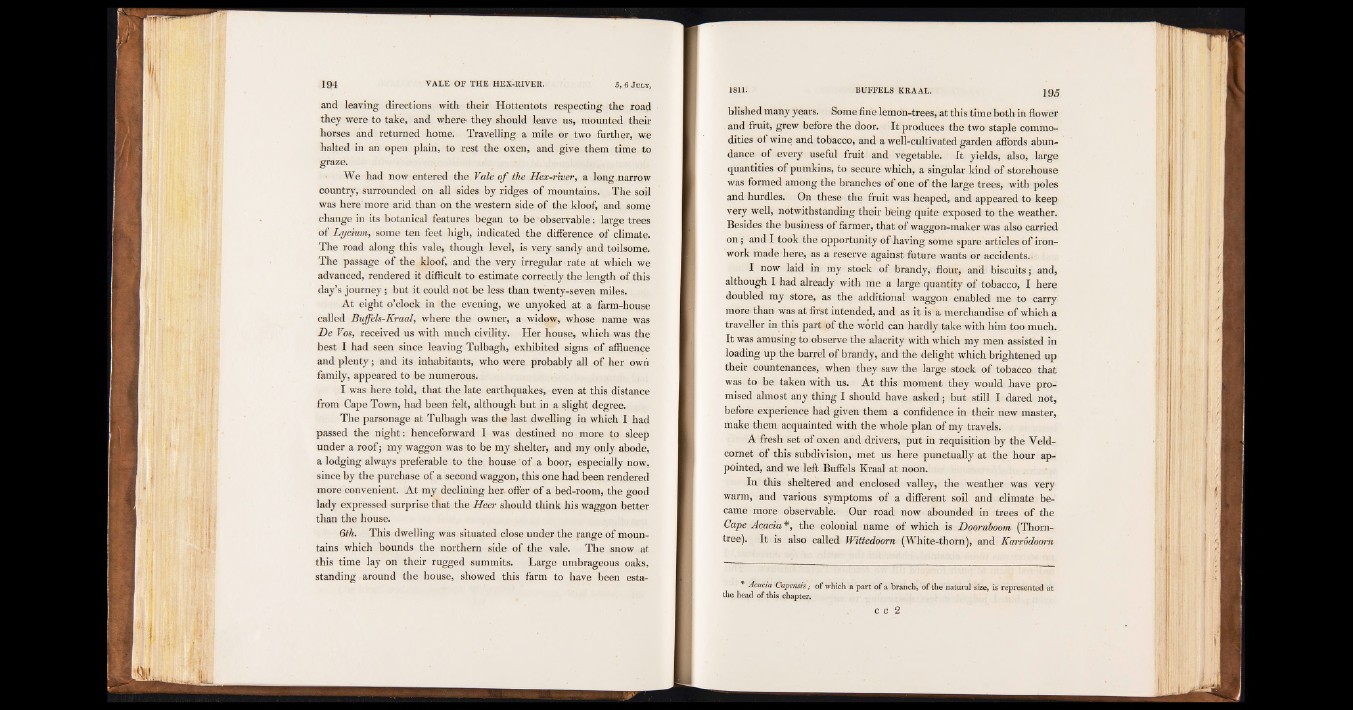
and leaving directions with their Hottentots respecting the road
they were to take, and where- they should leave us, mounted their
horses and returned home. Travelling a mile or two further, we
halted in an open plain, to rest the oxen, and give them time to
graze.
We had now entered the Vale o f the Hex-river, a long narrow
country, surrounded on all sides by ridges of mountains. The soil
was here'more arid than on the western side of the kloof, and some
change in its botanical features began to b e ' observable: large trees
of Lyceum, some ten feet high, indicated the difference of climate.
The road along this vale, though level, is very sandy and toilsome.
The passage of the kloof, and the very irregular rate at which we
advanced, rendered it difficult to estimate correctly the length of this
day’s journey; but it could not be less than twenty-seven miles.
At eight o’clock in the evening, we unyoked at a farm-house
called Buffels-Kraal, where the owner, a widow, whose name was
De Vos, received us with much civility. Her house, which was the
best I had seen since leaving Tulbagh, exhibited signs of affluence
and plenty; and its inhabitants, who were probably all of her own
family, appeared to be numerous.
I was here told, that the late earthquakes, even at this distance
from Cape Town, had been felt, although but in a slight degree.
The parsonage at Tulbagh was the last dwelling in which I had
passed the night: henceforward I was destined no more to sleep
under a roof; my waggon was to be my shelter, and my only abode,
a lodging always preferable to the house 'of a boor, especially now,
since by the purchase of a second waggon, this one had been rendered
more convenient. At my declining her. offer of a bed-room, the good
lady expressed surprise that the Heer should think his waggon better
than the house.
6th. This dwelling was situated close under the range of mountains
which bounds the northern side of the vale. The snow at
this time lay on their rugged summits. Large umbrageous oaks,
standing around the house, showed this farm to have been established
many years. Som e fine lemon-trees, at this time both in flower
and fruit, grew before the door. It produces the two staple commodities
of wine and tobacco, and a well-cultivated garden affords abundance
of every useful fruit and vegetable. It yields, also, large
quantities of pumkins, to secure which, a singular kind of storehouse
was formed among the branches of one of the large trees, with poles
and hurdles. On these the fruit was heaped, and appeared to keep
very well, notwithstanding their being quite exposed to the weather.
Besides the business of farmer, that of waggon-maker was also carried
o n ; and I took the opportunity of having some spare articles of ironwork
made here, as a reserve against future wants or accidents.-
I now laid in my stock of brandy, flour, and biscuits; and,
although I had already with me a large quantity of tobacco, I here
doubled my store, as the additional waggon enabled me -to carry
more than was at first intended, and as it is a merchandise of which a
traveller in this part of the world can hardly take with him too much.
It was amusing to observe the alacrity with which my men assisted fn
loading up the barrel of brandy, and the delight which brightened up
their countenances, when they saw the large stock of tobacco that
was to be taken with us. At this moment they would have promised
almost any thing I should have asked; but still I dared not,
before experience had given them a confidence in their new master,
make them acquainted with the whole plan of my travels.
A fresh set of oxen and drivers, put in requisition by the Veld-
cornet of this subdivision, met us here punctually at the hour appointed,
and we left Buffels Kraal at noon.
In this sheltered and enclosed valley, the weather was very
warm, and various symptoms of a different soil and climate became
more observable. Our road now abounded in trees of the
Cape Acacia *, the colonial name of which is Doornboom (Thorn-
tree). It is also called Wittedoom (White-thorn), and Karrodoom
Acacia Oapensis ; of which a part of a branch, of the natural size, is represented at
the head of this chapter.
c c 2